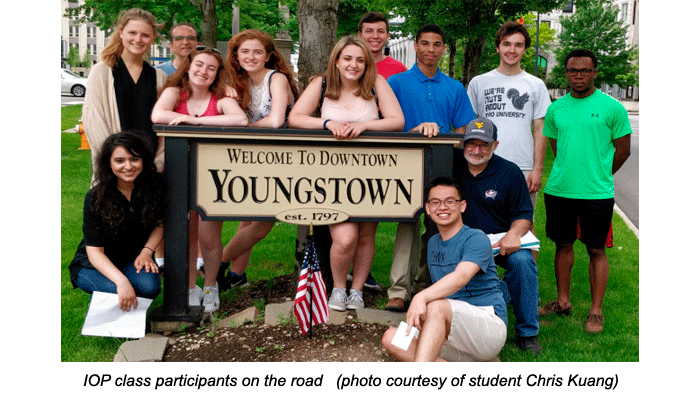
by Lil Tuttle
The 2016 election of Donald Trump surprised many people, but probably not national political journalist Salena Zito, who writes regularly for the New York Post and the Washington Examiner. Ms. Zito spent several months leading up to the November election traveling through small-town America and posting dispatches about her conversations with the people who live in them. Following the election, she teamed up with Brad Todd to co-author The Great Revolt: Inside the Populist Coalition Reshaping American Politics.
Recently, she teamed up with the Harvard Institute of Politics (IOP) to conduct a unique college class, dubbed the Main Street Project, which she explains in her latest article, These Harvard Kids Got the Lesson of Their Lives in the Heartland.
I have been a national political journalist for nearly 15 years. Whenever and wherever I travel in this country, I abide by a few simple rules: No planes, no interstates and no hotels.
And definitely no chain restaurants.
The reason is simple: Planes fly over and interstates swiftly pass by what’s really happening in the suburbs, towns and exurbs of this nation. Staying in a hotel doesn’t give me the same connection I can get staying in a bed and breakfast where the first person I meet is a small-businessperson who runs the place and knows all the neighborhood secrets. The same is true of going to locally owned restaurants versus chains.
Also, you have to spend time in a community to really report on it. Parachuting in for a few hours to interview the locals can lead to flawed evaluations. When you are short on time, your instincts can get blurred and you gravitate toward the shiny objects, the oddball people and conditions that make the most noise, instead of taking a broader focus on the bigger, fuller picture.
Those simple rules are what intrigued students at the Harvard Institute of Politics (IOP) after hearing me speak at a Pizza and Politics event on the school’s campus last fall.
Days after my speech, two IOP directors said the students wanted to learn more from me. I told them the best course would be a total immersion into the less-populated parts of the country, no different from the way I approach my daily job.
Only one of the students in the class had any experience with “what life was like outside the coastal cities and states.” Before the class began traveling, it “held several workshops to discuss their ideas about the ‘other’ America.”
They admitted they had been fed a steady diet of stereotypes about small towns and their folk: “backwards,” “no longer useful,” “un- or under-educated,” “angry and filled with a trace of bigotry” were all phrases that came up.
And so we embarked on our journey. For the next few weeks, I would conduct three classes in rural and industrial towns in Massachusetts, New Hampshire, Ohio and Pennsylvania. Most of the trips were a two- to four-night stay, getting from place to place in a van and sleeping in locally owned B&Bs.
The article is a wonderful story of the 19-member class’ adventure: where they traveled, what they saw, whom they met, and what they learned along the way.
The students even came up with a better name for the Main Street Project. They called it #IOPening — a hashtag blending their eye-opening experiences with the acronym for their institute.
If you’re prepared to smile and enjoy seeing stereotypes on both sides “blown up right in front of you,” read Selena Zito’s full story.
